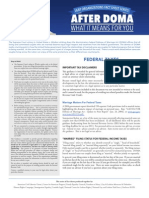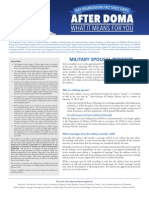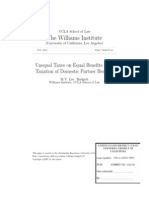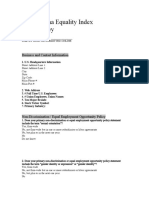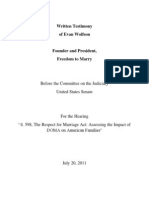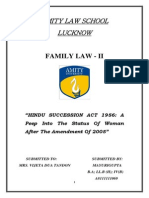DOMA: How will the supreme court decision impact employers?
By HR Pros of the CertiPay HR Support Center October 2013 In June 2013, the U.S. Supreme Court held a portion of the federal Defense of Marriage Act (DOMA) to be unconstitutional. Under DOMA, social security survivors benefits, immigration sponsorship rights, the ability to file joint federal tax returns and the protection of federal officers family members among other rights were not extended to same-sex spouses. The decision striking down part of DOMA came in the case of United States v. Windsor which arose when Edith Windsor was assessed estate taxes on her deceased same sex spouses estate. Windsor filed a lawsuit against the federal government claiming that the denial of the federal surviving spouse estate tax exemption under DOMA was unconstitutional. The Supreme Court agreed and found that Section 3 of DOMA infringed upon the 5th Amendment right to Due Process. Thirteen states and the District of Columbia currently or will soon recognize samesex marriages. For employers with operations in these jurisdictions, the Court's decision means benefits plans must treat all lawfully married employees who also live in a state that recognizes same sex marriage equally, including how they handle eligibility, taxation and the continuation of benefits under COBRA. Lawfully married same-sex partners are also covered by the Family Medical Leave Act. Immigration status will additionally be affected by this ruling. While the result of this case for those living in states that recognize same sex marriage is fairly straightforward, the situation is much murkier for couples living in states that do not recognize same sex marriage. This is because even if a couple who lives in a state that does not recognize same sex marriage goes to another state to get married, certain federal benefits seemed to be tied to the state of domicile (i.e. where the couple lives) and not the state of celebration (i.e. where the ceremony took place). Since the decision, we have been waiting on communication from the federal government to help clarify the situation. Now we have guidance from two agencies on issues that directly affect employers. First we heard from the Department of Labor that for purposes of the Family Medical Leave Act (FMLA) it will be using the state of domicile to determine whether a same sex spouse should be included in the definition of spouse.
�What this means for employers is if an employer (no matter where the employer is located) has an employee who has a same sex spouse and lives in a state that recognizes same sex marriage, that spouse should be treated as a family member for FMLA purposes. This rule can be very difficult to apply, so employers must be careful to get it correct. For example, same sex marriage is legal in Maryland and Washington D.C. and is not legal in Virginia. If a Washington D.C. employer has two employees, one who lives in Maryland with her same sex spouse and one who resides in Virginia with his same sex spouse, only the employee who lives in Maryland is eligible to have her spouse treated as a family member under FMLA. While it may be tempting for an employer to simply have a policy that grants leave to both couples identically under similar circumstances, for purposes of tracking FMLA leave time it is important to know which same sex spouses count as spouses under FMLA. Additional changes noted by the Department of Labor will affect the Employee Retirement Income and Security Act (ERISA). As the IRS has determined, the definitions of spouse and marriage will also apply to ERISA, meaning that samesex spouses will be eligible for the same benefits as opposite-sex spouses if the marriage is considered to be valid in the state in which it was held. Federal law will also provide same-sex spouses the entitlement to equitable treatment under the Health Insurance Portability and Accountability Act (HIPAA) as well as continued benefits coverage under the Consolidated Omnibus Budget Reconciliation Act (COBRA) as are opposite-sex spouses. Much like the benefits provided under FMLA and ERISA, same-sex spouses who were married in any state that recognizes same-sex marriages, without regard to the state in which the employee resides will be entitled to coverage under COBRA and HIPAA. Most recently, the Treasury Department issued guidance stating that for all federal tax purposes, it will use state of celebration to determine who is and is not a spouse. This is a much simpler rule to apply as the employer does not need to know who lives where and have different rules for different employees. Instead, the employer simply needs to determine whether its employees are married. In doing so, however, employers should be careful to not ask for more proof of marriage from same sex couples than it does from opposite sex couples, as that may be discriminatory. While employers who operate in multiple states or who have large numbers of employees who reside in different states may be most affected by the Supreme Court decision overturning part of DOMA, all employers will potentially be affected and should be attentive to any additional guidance from the government. Visit us at www.certipay.com

